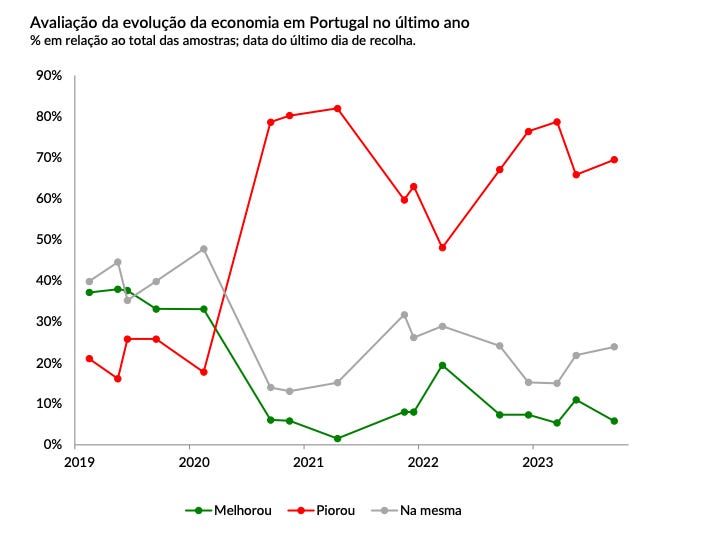The shocking rise of bacalao brownshirts
A look at how the far-right finally gained purchase in a country thought to be immune.
Everywhere I went in Portugal, I saw André Ventura.
His visage loomed over traffic circles in Lisbon, greeted me at the train station in Porto, peered over stone walls in country towns. In these campaign billboards, he vows to “cleanse” the Portuguese political class of its “shame.”
It’s not weird that a small opposition party might use rhetoric like that ahead of a snap election called as a result of the sitting government collapsing in a corruption scandal. What is unusual is the politics Ventura represents.
He’s the head of Chega – Portuguese for “enough” – the first far-right party to go mainstream in the country in the 50 years since this nation regained democracy.
While much of Western Europe embraced right-wing populist parties over the past decade, Portugal was part of what political scientists called the "Iberian exception."
Like Germany and Italy, Portugal and Spain lost their democracies to fascism in the Great Depression. But unlike the former two, whose dictators fell during World War II, the Iberian nations stayed neutral and their regimes remained in power until the 1970s. With such recent memories of secret police and torture at the hands of a tyrannical state, both countries bucked the trend that saw the rise of France's Marine Le Pen, the Netherlands' Geert Wilders and Britain's Brexit-thumping Nigel Farage.
That began to change in Spain in 2019, when, as I reported in early 2020, anger over the Catalonia independence vote and the ruling center-left government's response to it fueled the rise of the far-right Vox party.
Separatism isn't a problem in linguistically homogeneous Portugal. But after years of recovering from its 2011 debt crisis so well that pundits nicknamed Portugal as an economic model of “sardine capitalism,” the economic malaise that set in after the COVID-19 pandemic – and fresh outcry over corruption – are together propelling Chega’s uptick in the polls ahead of the March election.

Chega isn’t advocating for a “Pexit” from the European Union or an end to all immigration. But the party – and Ventura in particular – attracted attention with rhetoric explicitly targeting Portugal’s Roma population, which makes up less than 1% of the country. In June, the Global Project Against Hate and Extremism listed Chega among 13 hate groups in Portugal, a list that also included the local chapter of the Proud Boys gang and openly neo-Nazi organizations.
Ventura’s rhetoric has unlocked what Jose Fernandes, a restaurant owner and the head of the nonprofit Techari representing Roma people in the Lisbon suburb of Loures, described as a “hidden racism” in Portugal.
Despite being fined in 2020 for racist comments, Ventura delivered a speech before Parliament the following year in which he railed against the Roma, and there was no censure from the other parties, Fernandes said.
“The other parties say they’re democratic but they did not do or oppose anything that was said about the Roma community ― this is the constant struggle Roma people have lived and continue to live,” Fernandes said via email. “This is also their fault. We have lived in this country for five centuries and we’re still in the migratory phase.”
Chega, he told me, “has nothing to give this country other than racial hatred.”
If this isn't enough to hook some of you, let me add one more detail that might: Chega is also one of just two small parties in Portugal that openly support nuclear power, raising questions about how its rise might affect the energy debate in the country.
You can read the full story here on HuffPost.
Some other news I’m tracking:
Michigan goes green. On Wednesday, Gov. Gretchen Whitmer signed a slate of clean-energy bills that put the state at the center of America’s industrial heartland on a path to decarbonization. You can read my coverage of when the bills passed in the legislature earlier this month, and when the second-term Democrat threw her weight behind the effort in August.
New AP-1000 reactors in the U.S.? After completing the first of this new kind of large-scale reactor at the Plant Vogtle project in Georgia, nuclear giant Westinghouse said it expected all future sales of these machines to be overseas. But the company now tells Bloomberg that U.S. utilities are interested in large-scale nuclear again. (You can read more on the debate over the size of future American reactors here on HuffPost.)
The rich are staying rich. New members of the global billionaire elite are amassing more money through inheritance than in wealth creation for the first time in the nine years since the Swiss bank UBS began surveying on the topic, according to a Financial Times writeup.
Battery prices are falling. After briefly ticking upward as the price of metals needed to make them rose, the average global price per kilowatt-hour of a lithium-ion battery pack fell to $139 this year from last year’s $161, BloombergNEF data cited by Inside Climate News’ Dan Gearino.
‘The face of evil in Lāhainā.’ That’s how some describe the libertarian developer Peter Martin, one of the largest landowners in Maui, who has dismissed Indigenous Hawaiian water preservation practices as a “crock of shit” as he charges ahead with luxury real estate plans. It’s well worth reading this profile of Martin in Grist.
Thank you for your time and attention. I hope you felt this update earned it. If not, maybe this song recommendation will. It’s called “give me ur love” by Another Chemical Love Story, a project of British house DJ Elliot Adamson.
If you aren’t already a subscriber to this newsletter, please consider signing up or sending it to someone who might be interested.
Signing off from sunny Bay Ridge, Brooklyn, where – while everyone else seems to be considering challenging our scandal-prone Mayor Eric Adams – the newly victorious Democratic councilman is reportedly eying a run for U.S. Congress against the Republican Rep. Nicole Malliotakis, whose Staten Island district overlaps with our southwesternmost edge of Kings County.




